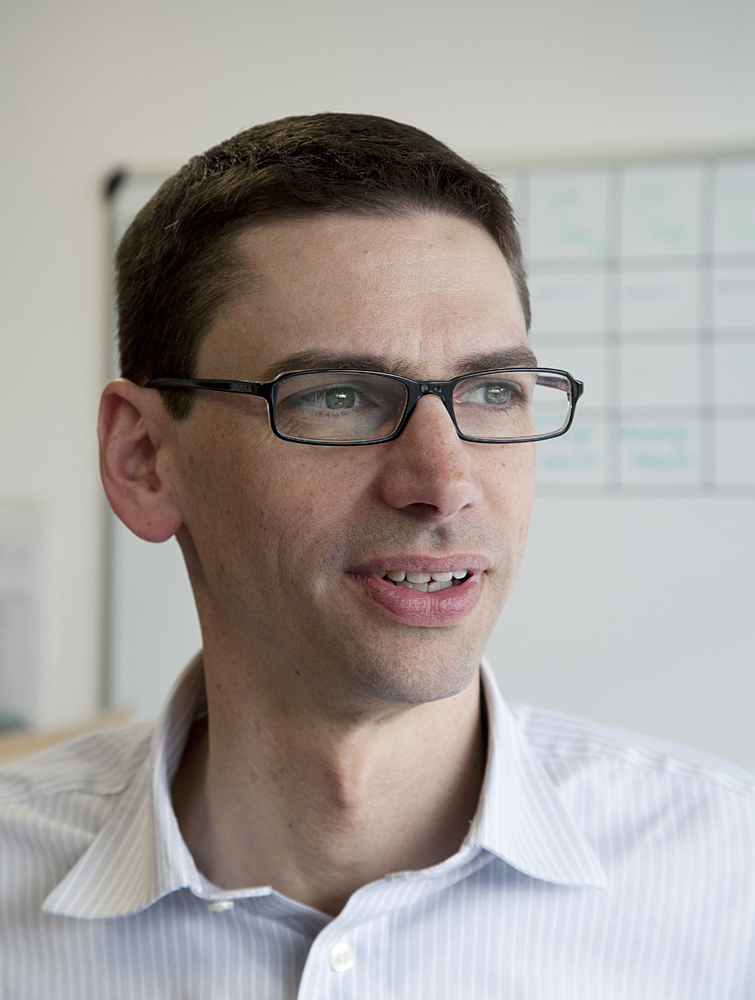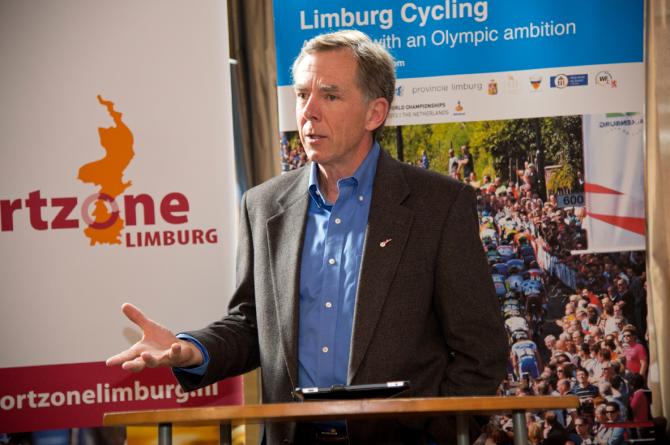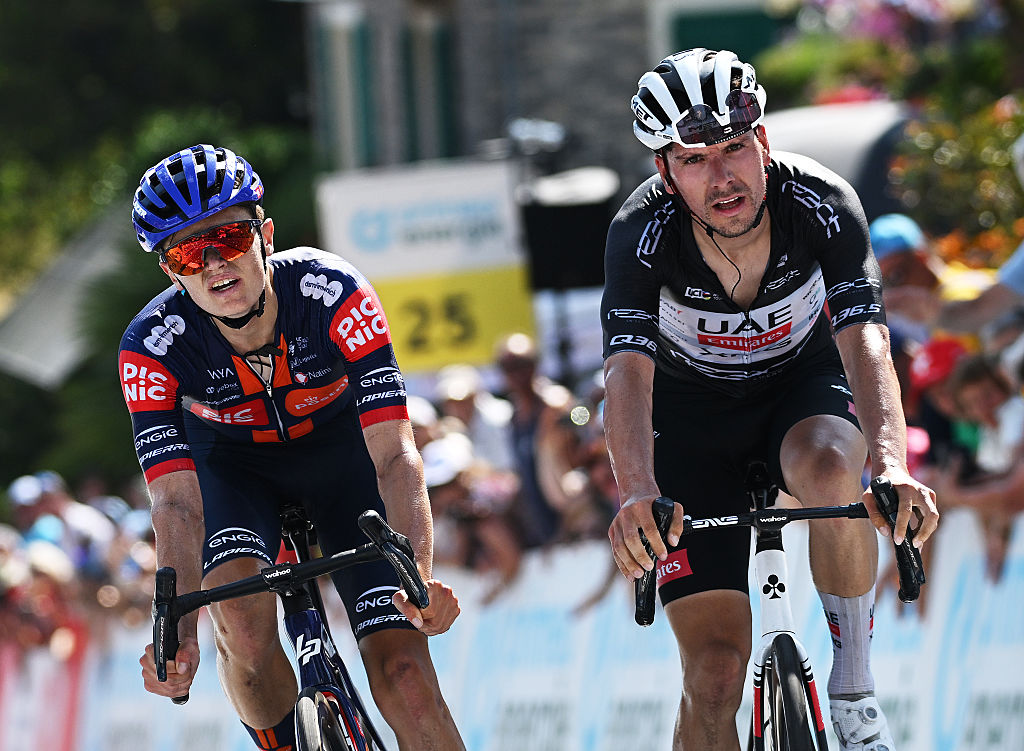Q and A with new USA Cycling CEO Derek Bouchard-Hall
‘We’re really trying hard to do the right thing here,’ says 45-year-old former pro
The latest race content, interviews, features, reviews and expert buying guides, direct to your inbox!
You are now subscribed
Your newsletter sign-up was successful


After nine years with Steve Johnson at the helm as CEO, USA Cycling is changing direction with his replacement in Derek Bouchard-Hall, a former professional cyclist who has spent the past decade as a business consultant in the US and Great Britain.
Bouchard-Hall, who rode for the the Shaklee and Mercury teams, was the 2000 US Criterium champion and competed in major events like Paris-Roubaix, Ghent-Wevelgem and the World Championships. He represented the US in the 2000 Olympics before retiring in 2002.
He went on to earn an MBA from Harvard Business School and then began a career in consulting with Ernst & Young in Boston and McKinsey in London. He joined Wiggle in 2011 and rose to a leadership role in international business at the global online retailer.
When USA Cycling hired Bouchard-Hall, board of directors chairman Bob Stapleton praised his track record of successful customer engagement, saying he has proven to be a highly effective leader of change. Expectations are high for Bouchard Hall, who turned 45 in July, but so is enthusiasm for his selection as Johnson's replacement.
Cyclingnews caught up with Bouchard-Hall last month in Colorado at the USA Pro Challenge, where he rode the time trial ahead of the women's race.
Cyclingnews: You've got to be pretty excited to take the helm of a sport that you've been involved in for so long?
Derek Bouchard-Hall: Yes, Absolutely. It's very, very exciting and fun. It's hard work. It's a very steep earning curve. Of course I know the sport of cycling, but how it actually works and the complexity of the community that's involved, I have a lot to learn. A lot of listening, but it's really fun.
The latest race content, interviews, features, reviews and expert buying guides, direct to your inbox!
CN: How has the reception been so far? I've heard a lot of positive reaction to your hiring. What kind of comments have you heard?
DBH: It's been very positive. The things people have said to me personally and the things that I've read have been very positive. We've worked hard to try and explain the board's rationale of selecting somebody like myself. And I've been working hard to try and give the perspective of things that I care about. And that has seemed to land exactly as we wanted it to.
I think my background – that I come from the sport and I've got some business experience and a long track record of working in management and really caring about cycling – resonates with people. And my resume makes sense that I can do this job. Now people are kind of waiting for, well, what does he care about, what's his strategy, what's happening, what's going to be different.
Sort of that initial landing of it, it seems to be a sensible choice from the resume standpoint, which I hope and believe that it is. That has landed well with people. It does sort of leave the impression that the board thought very critically and thoughtfully and in a very reasoned way about what do we want from somebody in this position, what is that kind of background. It was not sort of a – which is the way these can be – which is a who do you know, who are your friends, who's been around.
It was actually a wide-open, what are the right characteristics of somebody to take this role. So I think it's been incredibly positive. I feel like I'm in that honeymoon period people have with positive expectations. Now it's time to start doing something to keep that momentum going, because it won't last forever if we don't start moving things in ways that people want to see.
CN: Moving forward once you get your feet on the ground, what is your big priority? Do you have an initiative that you want to start pressing forward with right away?
DBH: I'm trying to coalesce that right now. I'm on day 57 today, which includes two weeks of holiday in the middle there as well, so it's all very early. I'm trying to wrap my head around what is it that I should focus on. I've got it down to just a handful of things.
One is that I'd really like to change perspectives about what USA Cycling is and the role that we can play, particularly being a source of good and of unquestionable integrity in helping to manage and govern the sport.
So, for example, our stance against doping, our open transparency, being a force for helping women's cycling, people seeing us as helping progress causes that people believe in, to really make some demonstrable steps in those regards, so people feel like, hey, USA Cycling is part of the solution to making cycling the sport we would all like it to be. That's very important.
Another thing is that we really have a strong focus on the racing experience of the everyday racer. A lot of people think of USA Cycling as very elite focused and it's about medals. But it's not. That's only a portion of our mandate. It's only a portion our elite mandate. The other half is that we're supposed to be about running a sport and helping the sport grow at the everyday participation level, having it be safe, well run, easy to do with limited barriers. So we really want to focus our energy on that.
The other thing I think is that we want to make sure we're helping all disciplines so that this is not just a road organisation. We are also about BMX, mountain biking, cyclo-cross, track. And we want to help those efforts grow. It's integral. That's going to require growing the pie and having more resources, but it's unquestionably about all of the disciplines.
Another thing is that on the elite side we have some fantastic athletes and some fantastic success stories that particularly USA Cycling has been a part of. But it's not broad enough. We're not where we would like to be on track, for instance. We're not where we want to be on all the disciplines like mountain biking and downhill.
If you look at where American athletes are across all the disciplines, It's hard to say we're satisfied with where we are. Again, it's a resource question. We're very much interested in having a broader range of success than we have right now.
And then, finally, I think in our cycling community, USA Cycling has some troubled partnerships. Our relationships with some of our LAs, and that there are some groups doing fantastic things like OBRA and NICA that we're not working as well together as we'd like to.
Officials would like to see us do things differently, race directors. We want to mend those relationships and get back to good partnerships. So I've been spending a lot of time reaching out to them trying to understand the source of friction where there is friction. Sometimes it isn't that there's friction, it's just that they're not working as well; we don't have a strong enough relationship. So we want to bring that together as well.
So those are the areas I've identified. Those have largely been driven by the interests of the board and what people have been telling me through emails. I've been going to a lot of races, a lot, a lot of phone calls. And that to me is what we want to focus on. I would hope that the ability to address those things and push forward will ultimately be where I get measured on and what our organisation is measured on.
CN: What do you think USA Cycling is doing really well right now as you come into it?
DBH: I think we've established a good financial footing. That's one thing it's done really well. That has not always been the case. But we actually have developed a way in which we have a strong financial position. Not a very big, but a very, very valuable balance sheet. We have a robust financial mechanism, so we're in good financial health.
Some of our programs are very successful. Our U23 program has been very successful. That is a good program that has generated a lot of great athletes, including the winners of the first three stages of the USA Pro Challenge. Some of our women's programs are successful, our track program. They're not getting what they deserve, but they are getting something and we are getting them to the Olympics and winning medals, so we are proud of that.
On the BMX side, that is a really strong element for the sport of cycling and we have really strong BMX athletes. So we have some success stories on our side. The problem is that we don't have enough resources to have a broader base, which is a little disappointing.
On the everyday amateur side, we do have 70,000 members competing in tens of thousands of racer days, and that's great. The sport of cycling is pretty healthy in America. A lot of people are participating. We're not satisfied at where we are in terms of events and number of events and field sizes and travel times. There are issues we want to address. But I don't think USA Cycling can lose sight of the fact that we actually have a pretty healthy participation sport. The disappointment comes from we'd like it to be more, but we do have 70,000 people out there participating in a lot of events, and I think that's great.
CN: I think a lot of people see you as a reformer coming in. There have been some issues in the past, you know, with US Postal and some accusations made against Steve Johnson that maybe he knew more about that than he let on. Do you see yourself in that role coming into the organisation?
DBH: I don't think I see myself as a reformer, but absolutely I think I'm in a great position on some of these issues to make it unequivocal what USA Cycling's stance is. On doping, it's going to be absolutely clear where USA Cycling's stance is. There will be no doubt whatsoever that we are staunchly against it. And we are working on a few things right now, where we are trying to make the penalties more severe, more testing, more education and really being the voice of moral authority.
I myself competed during that era. I experienced what it was like to try and compete clean and then felt the moral outrage that one feels at being cheated by that. But today I also understand how awesome it is to compete clean.
That's something that I'm just in a great position to do, given my history, and I think everyone who is in a leadership position in the sport from that era was really challenged by that. And there aren't very many managers who have come out of that without having to face some criticism: could you have done more, should you have done more?
That era is passed. Doping is still a problem, but I have the benefit of coming into it fresh and new, with my particular history. I've been staunchly for clean cycling all along. That puts me in a powerful position. Does that make me a reformer? I don't know. But there's going to be no doubt on that particular issue where we stand. Hopefully we see some interesting things that come going forward.
There are other elements where just change of leadership brings a fresh look at things. And I absolutely, along with the board and Bob Stapleton in particular, are taking a business-minded approach of being very critical about what resources do we have, how are we allocating them, is that a fair allocation, is it defensible, are we happy with it, what are our goals, can we achieve them. If we can't, let's get more resources.
We're going to take that very critical approach to it, and I hope that's how I will be seen, as to not having any particular bias toward one group. We're about amateur, we're about elite, we're about all five disciplines. We've got limited resources, how do we use them while at the same time saying we need more, what can we do? And I'll be going at that as hard as I possibly can.
CN: You said earlier that cycling in the US was pretty healthy. How is the organisation, USA Cycling. How would you grade USAC's health?
DBH: There are a lot of great individuals who have a real passion for the sport, but there's room for growth and maturity, there's no doubt about it. A lot of the time I spent as a management consultant I saw that in clearly high performance organisations, really everybody is focused on their role and held to high standards. And if they don't meet them then a change needs to be made, and I intend to do that.
There are some areas where we're not happy where the organisation is. I don't think we have enough focus, for instance, on the racer experience, because our organisation isn't structured that way and we'll make some adjustments to that.
There are changes that need to be made to reach those aspirations. The organisation is not at the level where I want it to be, but it has matured a lot. I was part of the organisation in 2000, and now I see it 15 years later and it is far more mature and it is a much better organisation. But there's room to grow. And I absolutely will and have been making some changes. I think it's a great opportunity.
CN: Is there anything else that you'd like to add or that you really want people to know?
DBH: I think one of the biggest things is to let people know that we are open for feedback and listening and ideas. I've got the Derek@usacycling.org email address that anyone can send an email to. I've received about 700 emails to date, and I've responded to every one of them myself. That will keep going. I'm on a listening tour right now.
We and the board do not see ourselves as having all the answers to how to do this. We are open to any ideas and criticism. I definitely want everyone to know that we want to hear that feedback. We are not closed to that feedback. We will do everything we can to adjust.
The Olympic movement is a very challenging one. Our operation is run on $14 million, which sounds like a lot of money until you realise how much we do: five disciplines, amateur and elite. That's to keep the lights on and everything. It's not a lot of resources. I've dealt with organisations where that is a tiny, tiny amount of money.
I was asked in the interview process, "What is the most striking thing you've seen by studying the financials?" I said, "I can't believe how little money you have." So we have a lot to do with a limited amount of resources, and that's important for people to keep in mind. But we're going to do what we can. We know there are areas that we're not satisfied with.
Mountain biking is not where we want it to be. Women's cycling is fantastic with amazing athletes, but women's cycling is not where we want it to be. But we will try our best to be part of that progressive force that's trying to make it better. I would hope that a year from now or few years from now, people can say, "Well did you meet those aims or not?" But there cannot be any criticisms about us having those aims and doing everything we can.
My responsibility is to say we're using those resources properly, we have good people, we're holding them to high standards, we're not incompetent, we're doing the best damn job we can, we're listening to people and trying to make it happen. That is our goal. That's Bob Stapleton's goal. We're really trying hard to do the right thing here.
Growing up in Missoula, Montana, Pat competed in his first bike race in 1985 at Flathead Lake. He studied English and journalism at the University of Oregon and has covered North American cycling extensively since 2009, as well as racing and teams in Europe and South America. Pat currently lives in the US outside of Portland, Oregon, with his imaginary dog Rusty.
